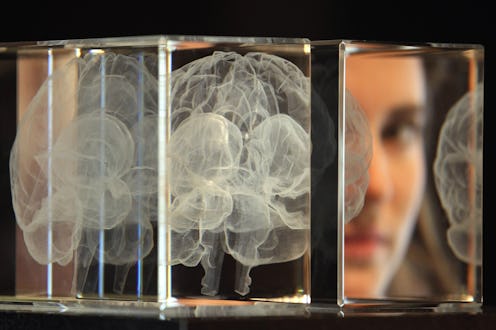Life
Science Says Your Brain May Be Just As Unique As Your Fingerprints

A distant sci-fi future where people can be identified using quickly taken MRI scans of their brains sounds far-fetched and not terribly practical, but according to a recent study, it may be possible to identify each and every individual person because our brains may be as unique as our fingerprints. And though we of course know our brains can be physically shaped by diseases, researchers behind the study, which was recently published in the journal Nature, found that our brains are physically affected by a number of surprising factors, including our experiences, personality traits, and even gender, potentially, according to the study report published in Nature.
Researchers behind the study, which comes out of the University of Zurich in Switzerland, theorized that based on "many scientific reports showing that many features of the human brain are modulated by genetic, non-genetic biological, and environmental influences interacting in a currently unknown manner," they would be able to identify individual people solely using scans of their brains showing unique anatomical quirks, according to the study report.
Participants in the study had to fit stringent requirements: All 191 of them were right-handed, between the ages of 64 and 85, and had "no history of neurological or psychiatric disorder, and did not suffer from migraine, diabetes or tinnitus," according to the study report. Of the 191, 100 participants were male, and 91 were female.
To test whether they could be identified by anatomical brain information alone, researchers took MRI scans of their brains three times over a period of two years, then used those scans to estimate a massive amount of mathematical data tied to each person, including "compartmental cortical volumes, thickness, and surface area measures for 148 brain regions," which combined with other measurements taken rings in at a total of 510 unique anatomical feature measurements per person, researchers wrote in the study report.
What researchers found showed that they were able to identify subjects based on their unique brain information more than 91 percent of the time, according to the study report. Their data reiterated that "the human brain is an organ with a highly individual architecture driven by specific genes, a specific environment, differential experience, and a combination of all three factors," researchers wrote in the study report. But on top of that, their data indicated, as a "complement [to other] neuroanatomical research," that our brains are physically shaped by "expertise, experience, learning, gender, ethnicity, age, giftedness, intelligence, personality traits, diagnosed psychiatric diseases, subliminal psychiatric diseases, and social status," researchers wrote.
Lutz Jancke, a professor at the University of Zurich at Switzerland and a lead author on the study, said in a statement, "The combination of genetic and non-genetic influences clearly affects not only the functioning of the brain, but also its anatomy," reported Business Standard.
Our brains are physically shaped by the lives we live.
Business Standard also reported that in the case of experiences leaving observable imprints on our brains, "Professional musicians, golfers or chess players, for example, have particular characteristics in the regions of the brain which they use the most for their skilled activity." Short-term events can also influence physical attributes in the brain, Business Standard added: "[I]f, for example, the right arm is kept still for two weeks, the thickness of the brain's cortex in the areas responsible for controlling the immobilised [sic] arm is reduced."
"We suspected that those experiences having an effect on the brain interact with the genetic make-up so that over the course of years every person develops a completely individual brain anatomy," Jancke said in a statement. Jancke added that the idea of a person's brain being anatomically unique is a fairly recent concept, since "[j]ust 30 years ago we thought that the human brain had few or no individual characteristics. Personal identification through brain anatomical characteristics was unimaginable."
He also said in the statement that folks worried about future tech being implemented so that, say, your phone scans your brain instead of your fingerprints to unlock, "is unlikely, as MRIs are too expensive and time-consuming in comparison to the proven and simple method of taking fingerprints," Business Standard reported.
While that particular avenue isn't one researchers will be taking, we can expect science to further pursue the theory that our brains are physically shaped by the lives we live, and that they are as unique, or possibly even more unique than, the rest of our bodies.